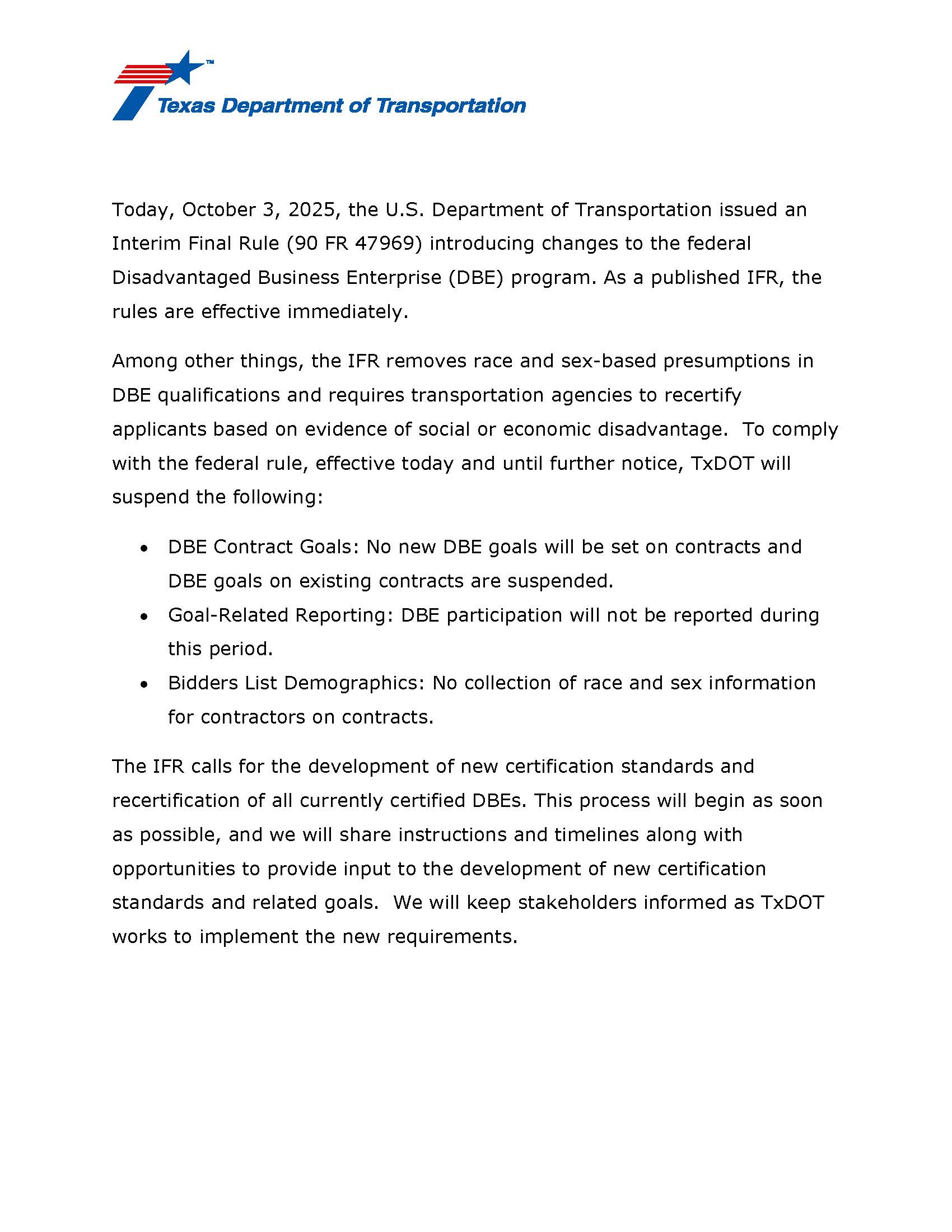Rolling Back Civil Rights in Contracting
The Interim Final Rule issued October 3, 2025, and TxDOT’s immediate suspension of DBE contract goals and related reporting, is deeply troubling. This action not only undermines decades of progress in ensuring fair participation of minority and women-owned businesses in federal transportation contracting, but it also raises profound legal concerns.
First, the outright suspension of DBE goals and demographic reporting directly conflicts with Title VI of the Civil Rights Act of 1964, which prohibits recipients of federal funds from engaging in practices that result in racial discrimination, intentional or otherwise. By halting data collection and goals, TxDOT effectively eliminates the very compliance mechanisms necessary to enforce Title VI. Without demographic reporting or goal setting, systemic disparities can remain hidden and unaddressed, perpetuating exclusion.
Second, the IFR contradicts binding Supreme Court precedent, including Adarand Constructors, Inc. v. Peña (515 U.S. 200, 1995), which recognized the compelling governmental interest in remedying the effects of past and present discrimination in federal contracting, provided programs are narrowly tailored. Similarly, in Grutter v. Bollinger (539 U.S. 306, 2003) and more recently Fisher v. University of Texas (Fisher II, 579 U.S. 365, 2016), the Court reaffirmed that remedying historic and ongoing racial disparities can justify race-conscious measures under strict scrutiny.
The IFR’s blanket removal of race- and sex-based presumptions—without providing a lawful, narrowly tailored alternative—amounts to a de facto elimination of civil rights protections in contracting. It goes beyond tailoring and instead strips away statutory protections Congress deliberately designed under the DBE program (49 C.F.R. Part 26).
Finally, suspending DBE goals and recertification requirements places minority and women-owned firms at an immediate competitive disadvantage. This runs counter to congressional findings underlying the DBE statute itself: that “Black Americans, Hispanic Americans, Native Americans, and other minorities” have been historically and systematically denied equal opportunity in federally assisted contracting. Congress reaffirmed this compelling interest through multiple reauthorizations of the DBE program.
In short, the IFR and TxDOT’s response appear not only regressive but in violation of Title VI, the Civil Rights Act of 1964, and established Supreme Court law. Stakeholders should consider immediate legal and policy challenges to protect the integrity of the DBE program and the civil rights of disadvantaged contractors.
J. Goodwille Pierre is on the Board of the National Bar Association, where he serves as Chair of the Small Business Law Section. He is also Regional Director of the Airport Minority Advisory Council (AMAC) and Managing Member of The Pierre Firm PLLC, a Houston-based law practice focused on intellectual property, business law, and government compliance. In addition, Pierre is the founder of Success in Business®, a nonprofit platform dedicated to empowering small and minority-owned businesses.
With more than two decades of experience in law, compliance, and community engagement, Pierre has represented clients in complex trademark, corporate, and public law matters while advising public entities on federal contracting and DBE/ACDBE compliance. His career reflects a commitment to advancing civil rights, promoting equity in government contracting, and expanding economic opportunity for disadvantaged businesses.
Pierre is also a frequent speaker, author, and organizer on issues at the intersection of law, business development, and democracy-building.

